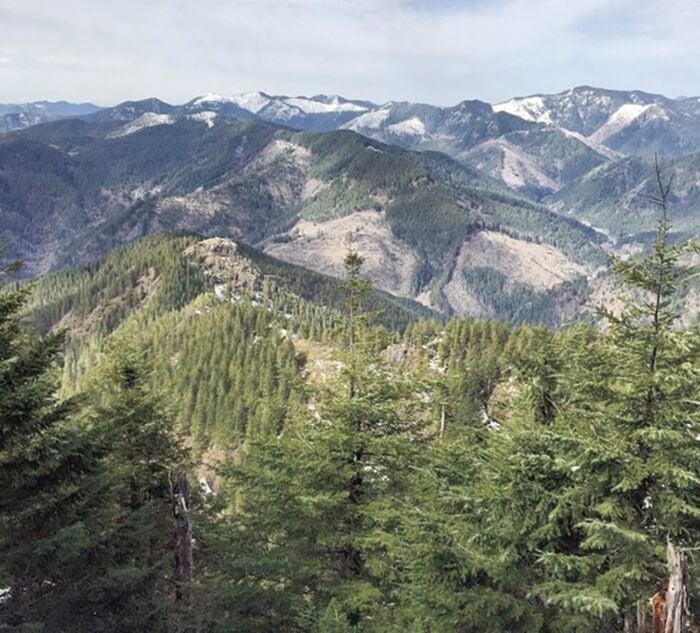PORTLAND, Ore. – The Trump administration has announced plans to eliminate longstanding federal protections on more than 58 million acres of national forests nationwide, including roughly 2 million acres in Oregon. The proposal would rescind the 2001 Roadless Rule, which has shielded some of the nation’s most pristine public lands from road construction, logging, and mining for over two decades.
The Roadless Rule and What’s at Stake
The Roadless Rule currently protects about 30% of U.S. Forest Service–managed lands, preserving wildlife corridors, watersheds, and old-growth ecosystems from development. The rule has long been regarded as a cornerstone of federal land conservation policy.
Eliminating it would open vast tracts of wilderness across 40 states to commercial logging, road-building, and mining. In Oregon, this includes some of the state’s most beloved natural areas, such as Iron Mountain in the Willamette National Forest, Joseph Canyon in Wallowa County, Tumalo Mountain in central Oregon, and Lookout Mountain in the Ochoco National Forest.
Also Read
“These forests are some of Oregon’s most treasured landscapes,” said Sami Godlove, central Oregon field coordinator for Oregon Wild. “From the flower-studded meadows of Echo Mountain to the headwaters of Tumalo Creek, which provides Bend’s drinking water, Oregonians value these places deeply. Now is the time to raise our voices to ensure they remain protected for future generations.”
Administration’s Justification
The rollback was formally announced by Brooke Rollins, head of the U.S. Department of Agriculture, who argued that the Roadless Rule represents “burdensome, outdated, one-size-fits-all regulations.” According to Rollins, removing the protections will boost economic growth by expanding opportunities for timber, mining, and infrastructure projects.
U.S. Forest Service Chief Tom Schultz, a former executive at one of Idaho’s largest lumber producers, echoed those arguments. He said the Roadless Rule has hampered local land managers and prevented them from addressing wildfire threats.
“The forests we know today are not the same as the forests of 2001,” Schultz said. “They are dangerously overstocked and increasingly threatened by drought, mortality, insect-borne disease, and wildfire. It’s time to return land management decisions where they belong — with local Forest Service experts who best understand their forests and communities.”
Scientific Concerns
Environmental scientists and fire ecologists dispute the administration’s claims. Research from Oregon State University Professor Chris Dunn found that most wildfires in western national forests between 1984 and 2018 began near roads, where human activity is more common. His study concluded that the presence of roads increases wildfire risk, undermining arguments that more road-building would reduce fire danger.
“The number one cause of wildfires is people,” Dunn noted, adding that restricting road development has actually helped reduce ignition points in vulnerable forests.
Conservation Community Pushback
The announcement sparked outrage from conservation groups across Oregon and the nation.
“Gutting the Roadless Rule — which has protected our forests for 25 years — would be the single largest rollback of conservation protections in our nation’s history,” said Tracy Stone-Manning, president of the Washington, D.C.–based Wilderness Society. “Americans cherish their public lands and deserve leaders who protect them for future generations, not give them away to corporations that exploit them.”
Erik Fernandez, wilderness program manager for Oregon Wild, warned that new road construction would bring invasive species, fragment habitats, and permanently alter ecosystems. “Once these areas are cut apart, we lose the clean water, wildlife, and solitude they provide forever,” he said.
Political Response from Oregon
Oregon lawmakers also voiced strong opposition. U.S. Rep. Andrea Salinas (D-6th District) called the rollback an assault on both conservation and climate policy.
“These pristine, undeveloped forest lands represent some of our most important tools in the fight against climate change,” Salinas said during a webinar hosted by the Oregon Sierra Club.
In June, Salinas introduced the Roadless Area Conservation Act, which would codify the Roadless Rule into federal law. Nearly 50 House Democrats, including Reps. Maxine Dexter and Suzanne Bonamici of Oregon, have signed on as co-sponsors. Other members of Oregon’s delegation, including Reps. Janelle Bynum, Val Hoyle, and Cliff Bentz, have not yet supported the measure.
Public Comment and Next Steps
The USDA has opened a 21-day public comment period beginning Friday and running through September 19. Environmental advocates are urging Oregonians to weigh in, warning that silence could pave the way for irreversible development in some of the state’s most ecologically valuable lands.
“This is the moment for the public to speak up,” Godlove said. “If these protections are stripped away, they’re not coming back.”
The Bigger Picture
The proposed rollback comes on the heels of two executive orders signed earlier this year by former President Donald Trump aimed at expanding logging on federal lands. Critics say the policies reflect a broader effort to prioritize industry over conservation.
For Oregon, the stakes are especially high. From the flower-filled meadows of the Cascades to the rugged canyons of the Wallowas, millions of acres of forests face an uncertain future.
As public comments open, the battle over the Roadless Rule will determine whether these wild places remain intact for future generations — or become open territory for roads, logging trucks, and mining operations.












